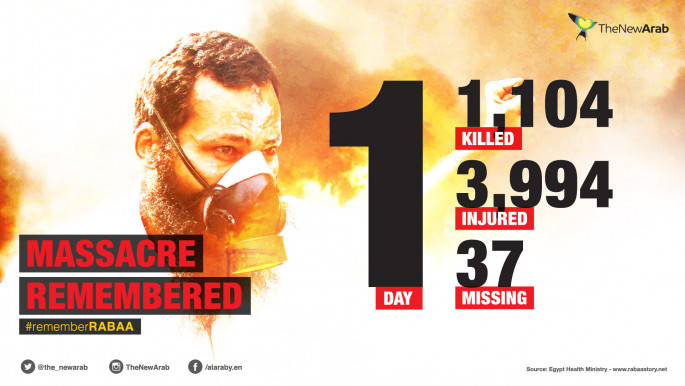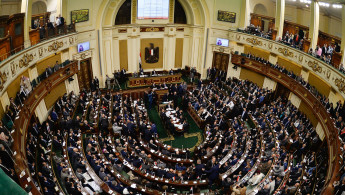Egyptian regime dismisses UN call for Rabaa massacre investigation
Egyptian officials hit back at the UN Secretary-General on Saturday after he called for a full investigation into the deadly Rabaa massacre that saw hundreds killed at the hands of security forces in 2013.
"We need a serious stand from the Egyptian Foreign Ministry to stop these allegations," Secretary of the Foreign Relations Committee, Tariq al-Kholi said in a statement issued in response.
Ban-ki Moon "neglected all issues and open cases, such as reinstating the rights of the Palestinians to address the victims of an armed group that staged a sit-in protest," he added.
"It is unacceptable for the Secretary General of the United Nations to neglect what is going on in a number of countries across the world regarding direct military intervention in Syria, clear violations of international law by the Israeli occupier, human rights abuses in other countries, scenes of torture witnessed by opponents in Turkey, all to talk about the rights of a terrorist group," he said.
Meanwhile, the sentiment was shared by parliamentarian Mustafa Bakri, who said the UN's statement was a direct "interference in the internal affairs of Egypt, and is an incitement of the international community against the ruling regime, led by President Abdel Fattah al-Sisi."
The Secretary-General is "turning a blind eye to the real culprit" he said, referencing the Muslim brotherhood who allegedly "invited protesters to an armed demonstration."
 |
Hundreds, more than a thousand by some counts, were killed that day in what human rights organisations have since declared massacres. |  |
On the eve of the massacre's third anniversary, Ban-ki Moon's deputy spokesman, Farhan Haq said that the UN chief "believes it is very important to conduct a full investigation on the killing of hundreds of civilians, and to respect the right to peaceful protest and freedom of assembly during demonstrations planned by opponents of the current regime organised on the third anniversary of the sit-in. "
The deadly event - named globally as the Rabaa massacre - left at least 800 pro-democracy protesters dead after security forced opened fire to disperse the large crowds taking part in a sit-in.
Egyptian security forces begun forcibly dismantling demonstrations at Rabaa al-Adaweya and al-Nahda in Giza, where thousands of supporters of deposed president Mohamed Morsi had been holding sit-in protests following the 3 July military coup.
Hundreds, more than a thousand by some counts, were killed that day in what human rights organisations have since declared massacres.
Hundreds of Egyptians have disappeared since the army deposed Morsi more than a year ago.
Reports issued by human rights organisations including Amnesty International, Human Rights Monitor, al-Nadeem and al-Karama have put the numbers of missing persons – not dead or injured, just “disappeared” - at anywhere between 200 and 500.
Since the deadly event, Cairo's ongoing crackdown has seen hundreds of anti-regime activists detained and many more missing.






 Follow the Middle East's top stories in English at The New Arab on Google News
Follow the Middle East's top stories in English at The New Arab on Google News
![Israeli forces ordered bombed Gaza's Jabalia, ordering residents to leave [Getty]](/sites/default/files/styles/image_330x185/public/2176418030.jpeg?h=a5f2f23a&itok=_YGZaP1z)

